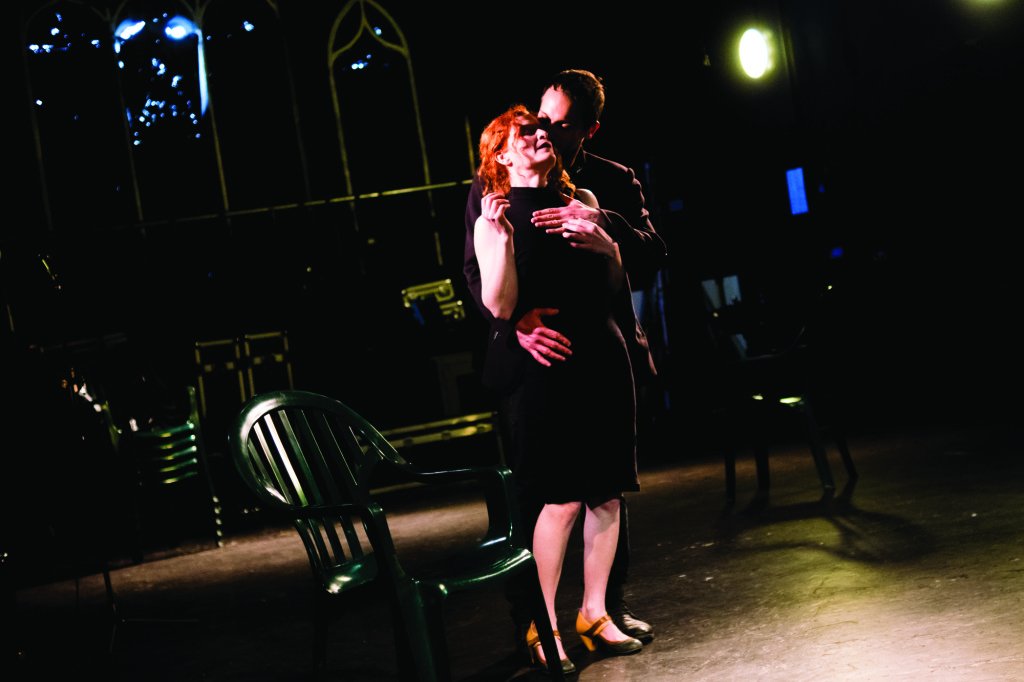Review: Home at the Unity Theatre
December 10, 2015

Inside Liverpool’s Unity Theatre, a small crowd were patiently anticipating the opening of a brand new show, ‘Home’. The room wasn’t grand, neither in size nor in style, while the open area performance space was barely distinct as a stage. If anything, the room felt more like a college’s performing arts space instead of a theatre, yet it was the perfect place for tonight’s play. The smaller, more casual location felt incredibly welcoming; it’s the kind of location which makes a performance feels more personal and offers a stronger connection with the actors.
Speaking of actors, the night’s three performers – Yorgos, Despina and Tatiana – made their entrance by abruptly bursting through a door at the back of the performance space. It was actions like these which made their sense of theatricality apparent from the get-go. They moved gracefully across the stage, and every action (whether dancing or simply playing around) was executed precisely, as if it were purposeful.
After about 10 minutes, the lights went down. This all seemed strange; had these events been a part of the play? These moments felt so well-constructed, so carefully prepared, but were they spontaneous? Were they intentionally done for dramatic effect? This was a perfect example of two key ideas presented throughout Home – the blurring of reality and fiction, and audience interpretation.
Ambiguity was one of the play’s strongest assets. What was purposefully created? What was a mere coincidence or accident? During a monologue from Despina, she referred to the show’s “guardian angel” Tatiana not as any specific character but as the actress, asking her to change the music. Effectively, Despina broke the fourth wall, however it instead seemed as though she was obscuring the fourth wall. Had it been rehearsed that she would ask for a song change, or was it a technical glitch? Maybe the answer was obvious to most people watching, but these moments flowed so seamlessly that they could have easily been crafted to make the audience question the validity of these scenes.
The setup of the entire show seemed to be based around these bizarre yet natural concepts. Home is already a perfect example of abstract theatre – it’s 70 minutes long (quite short for many theatregoers) and contains a minimal amount of props, on-stage costume changes and actor-operated technical equipment. The ideas in the show are just as fascinating as the production, from the intricately-weaved themes of love, lust, openness and acceptance to the seemingly out of place concept of “the economy”, played up and blatantly stated for hilarity. No matter how they were presented, these topics were enthralling and enjoyable.
In what could be Home’s stand-out scene, Tatiana sits down in a chair – a simple action, yet one exaggerated for dramatic effect. “Can I sit here?” she asked the audience, who mostly responded with silence, the occasionally moment of nervous laughter piercing the air. “I can adapt, I’m willing to adapt!” she told them, picking up another chair and moving elsewhere on the stage. She sat down on the seat with a look of pleasure spreading across her face, telling herself “Here. Here is good”. She frequently repeated these actions, filling the space with seats. Her actions became more rapid, more predictable, yet she retained the same look of satisfaction on her face.
This section was the perfect example of how Home used abstract performance to convey its messages. What is this scene about? Perhaps it represents the lengths people are willing to go to please those around them? Maybe Tatiana is trying to meet some sort of expectation? It could even represent lust, with each chair as a different sexual partner or erogenous zone. The audience was never told outright what these scenes were about. Some were simple, some more complex. It’s what made the show fascinating.
Home won’t please everyone. The show had no clear structure, no distinguishable narrative, and a heavy reliance on the abstract, and as a result it will have been off-putting for some. What may have been an unenjoyable experience for one person was the perfect show for another, and this is what makes Home utterly brilliant. It’s strange, confusing, ambiguous, thought-provoking, but most of all gripping.
Yorgos Karamalegos, the show’s director and sole male actor, described his work as aiming “to create deeply engaging theatrical experiences, where my audiences can make their own interpretations on the story and to reflect them on aspects of their own lives”. Based off the interesting setup, the quirky style of the show, and the indistinctness which runs throughout, Home fits this description perfectly.
Home is to be performed at London’s Chisenhale Dance Space on Friday 29th January 2016 and Saturday 30th January 2016.




Comments